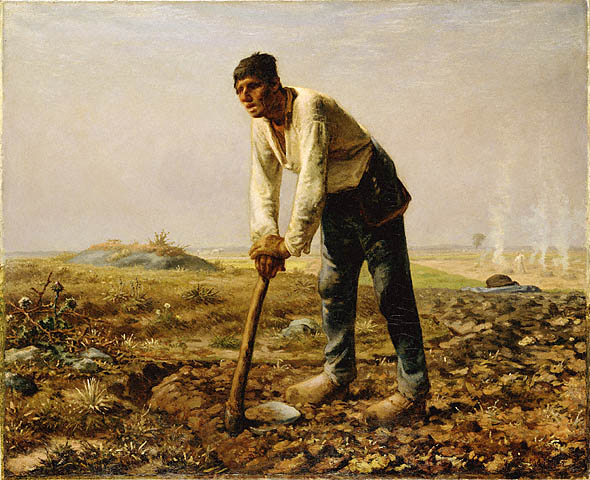――寫於米勒的世界名畫觀後
E. C. 麥克哈姆作[1]
傅正明譯
上帝依照自己的形象造人,依照他的形象造男造女。
--
祖輩的重擔壓彎了腰脊,
他手扶鋤頭凝望著大地,
背上馱著繁華世界的重負,
臉上布滿時代遺留的空虛。
是誰使他癡呆如壹頭老黃牛 --
既沒有歡樂也無所謂悲哀,
無所謂絕望也無所謂希冀?
是誰使他粗野的下巴下垂?
是誰的鐵腕使他緊鎖雙眉?
是誰將他腦中的靈光吹熄?
上帝創造生靈,讓他統治海洋
主宰大地,探索宇宙的奧秘,
尋求神力,感受永恒的熱情,
難道到頭來就是如此可憐的東西?
上帝塑造星辰, 標明運行的軌跡,
難道就夢出如此可怕的夢囈?
既然在地獄每個魔窟的最底層
也找不出比這更恐怖的形體 --
找不出更多的對貪婪世界的怨責,
找不出更糟的對人類靈魂的驚擾,
找不出更大的對宇宙秩序的沖擊。
他與六翼天使[2]何止宵壤之隔?
對於這苦役的轉輪之下的奴隸,
柏拉圖或七星詩社[3]的高雅有何意義?
入雲的歌聲染彩的晨曦
綻紅滴露的玫瑰又有何意義?
可怕的形體濃縮了祖輩的困難,
壓彎的腰脊展示著時代的悲劇;
被拋棄被劫掠被褻瀆被剝奪的人
向世界的判官發出抗議的吼聲,
呐喊震天呼喚著一場暴風雨!
啊,各國的主宰,老爺和大人先生,
這被扭曲的失卻靈魂的怪物
就是你們獻給上帝的工藝品?
妳們將怎樣伸直他壓彎的腰脊?
妳們將怎樣還給他不朽的靈魂?
妳們將怎樣讓他重新仰望天光
奏響音樂恢復那甜美的夢境?
妳們將怎樣洗刷歷史的恥辱和罪惡
治愈沉屙固疾,撫平累累傷痕?
啊,各國的大人先生,
未來同這個人的宿債將如何結清?
當反抗的風暴席卷世界之時,
怎樣回答義正詞嚴的詰問?
在千百年沉默的醞釀過後,
當喑啞的“恐怖”突然給上帝一個答復,
一切王國和養尊處優的王公貴族,
一切將他扭曲成非人的人,
怎樣的結局將等待著你們?!
1899年
譯註:
[1] 譯自美國詩人E. C.麥克哈姆 (1852-1950) 的詩集《扶鋤頭的人及其他詩歌》(The Man with the Hoe and Other Poems,1899)。米勒(Jean Francois Millet, 1814-1875),法國畫家,巴比松畫派的代表人物,曾長期在巴比松村莊從事農耕,是他的名作之壹。
[2] 六翼天使是九級天使中地位最高者。
[3] 七星詩社是文藝復興時期法國的壹個詩歌流派。
原詩:
Edwin Charles Markham
--Written after Seeing Millet's World-Famous Painting
Bowed by the weight of centuries he leans
Upon his hoe and gazes on the ground,
The emptiness of ages in his face,
And on his back, the burden of the world.
Who made him dead to rapture and despair,
A thing that grieves not and that never hopes,
Stolid and stunned, a brother to the ox?
Who loosened and let down this brutal jaw?
Whose was the hand that slanted back this brow?
Whose breath blew out the light within this brain?
Is this the Thing the Lord God made and gave
To have dominion over sea and land;
To trace the stars and search the heavens for power;
To feel the passion of Eternity?
Is this the dream He dreamed who shaped the suns
And marked their ways upon the ancient deep?
Down all the caverns of Hell to their last gulf
There is no shape more terrible than this--
More tongued with cries against the world's blind greed--
More filled with signs and portents for the soul--
More packed with danger to the universe.
What gulfs between him and the seraphim!
Slave of the wheel of labor, what to him
Are Plato and the swing of the Pleiades?
What the long reaches of the peaks of song,
The rift of dawn, the reddening of the rose?
Through this dread shape the suffering ages look;
Time's tragedy is in that aching stoop;
Through this dread shape humanity betrayed,
Plundered, profaned and disinherited,
Cries protest to the Powers that made the world,
A protest that is also prophecy.
O masters, lords and rulers in all lands,
Is this the handiwork you give to God,
This monstrous thing distorted and soul-quenched?
How will you ever straighten up this shape;
Touch it again with immortality;
Give back the upward looking and the light;
Rebuild in it the music and the dream;
Make right the immemorial infamies,
Perfidious wrongs, immedicable woes?
O masters, lords and rulers in all lands,
How will the future reckon with this Man?
How answer his brute question in that hour
When whirlwinds of rebellion shake all shores?
How will it be with kingdoms and with kings--
With those who shaped him to the thing he is--
When this dumb Terror shall rise to judge the world,
After the silence of the centuries?

